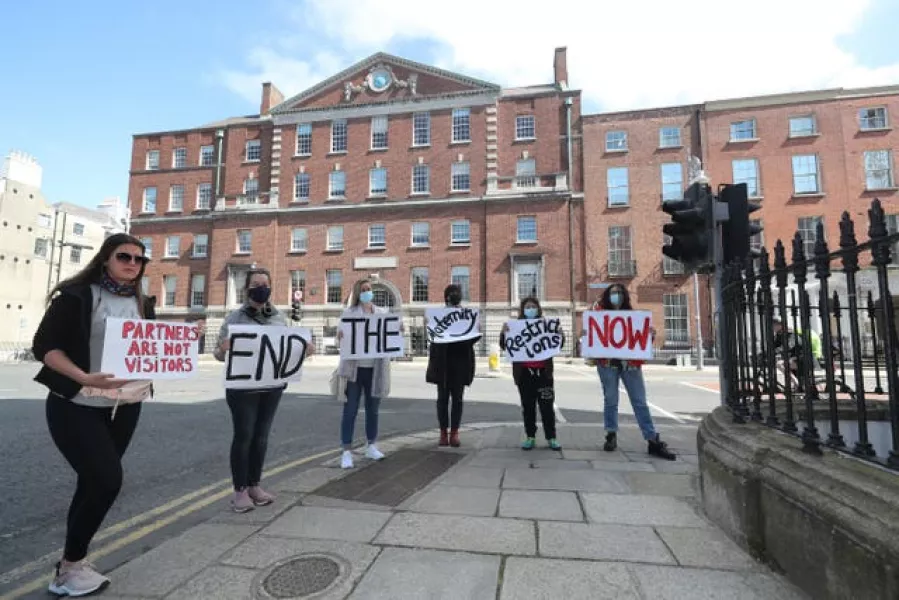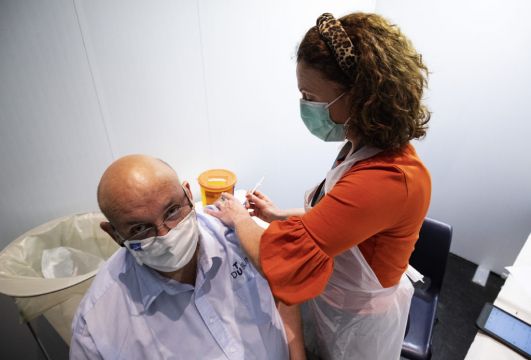Ireland is on course to pass a milestone two million vaccine doses administered on Thursday.
Around 27 per cent of people have now received their first vaccine dose, while 14 per cent have received both doses, making them fully vaccinated.
Taoiseach Micheál Martin paid tribute to vaccination teams across the country in advance of the target being hit.
Just informed by @HSELive that we are likely to reach the total of 2 million #CovidVaccines given out across Ireland by the end of today.
Another important milestone in our rollout – and tribute to the dedication of vaccines teams up and down the country. pic.twitter.com/A2jbqIWh5O— Micheál Martin (@MichealMartinTD) May 13, 2021
Advertisement
He tweeted: “Just informed by @HSELive that we are likely to reach the total of 2 million #CovidVaccines given out across Ireland by the end of today.
“Another important milestone in our rollout – and tribute to the dedication of vaccines teams up and down the country.”
Health Minister Stephen Donnelly also praised the efforts of vaccinators in helping to reach the milestone.
Speaking from a vaccination centre in Citywest on Thursday, he said: “It’s a huge amount of work.
“It just goes to show the amount of effort across the country, from all the different groups.
“There’s a lot of volunteers here as well, all over the campus, helping out.
“This truly is a national effort.
“I just want to say thank you to everyone involved.
“It’s likely that we will hit two million vaccine doses administered today.”
Amazing milestone that we are going to hit 2,000,000 vaccine doses administered today. A day we can all be proud of for the COVID-19 vaccination programme. I came along to Citywest vaccination centre to mark the moment. Thanks all for getting us here. @HSELive pic.twitter.com/haAj7H2OvN
— Stephen Donnelly (@DonnellyStephen) May 13, 2021
The vaccination programme has been picking up pace, with a record 250,000 doses expected this week, rising to between 260,000 and 280,000 next week.
The largest single day was recorded on Thursday last week, when around 50,000 doses were given.
Of those vaccinated so far, 90 per cent of people aged 85 and over have received both doses along with 93 per cent of people aged 75 to 84.
Among those aged 65 to 74, 93 per cent have received their first dose, and 19 per cent have received their second dose.
And among those aged 55 to 64, 54 per cent have received their first dose, and six per cent have had their second.
In a submission to the National Immunisation Advisory Council (Niac), the HSE have called for the Johnson and Johnson and AstraZeneca vaccines to be allowed “at least” for people aged 45-50.
New advice from Niac that will shape the future of the vaccine rollout is expected early next week.
It is considering whether to revise its recommendation that use of the J&J and AstraZeneca vaccines be limited to people over 50.
This has raised concerns that vaccines could go to waste, with the majority of over 50s expected to be vaccinated by the end of May, but large shipments of J&J due at the end of June.
The HSE have called for the age limits of those vaccines to be lowered.
HSE chief executive Paul Reid said the aim was to “keep the pace that we have, continue to do it safely and to utilise all of the vaccines throughout May and June”.
He added: “There’s no doubt that towards the end of June we have a high delivery volume of Janssen (J&J).
“So our submission was based on that, at least for the ages of 45 up to 50, we would be able to utilise the Janssen vaccine and likely, the AstraZeneca for those age groups.”
He said it would allow the rollout to continue based on age and would mean that up to 250,000 J&J doses are not wasted.
Meanwhile, Mr Reid said he has spoken to the chief executives of maternity hospitals in a bid to resolve the controversy over partner visits.
Despite the HSE issuing a circular that there is now no medical reason to prevent partners attending scans and other neonatal appointments with their partners, many are still being prevented from attending.
Mr Reid said that while partners should be allowed to attend, hospitals must be allowed to make local decisions about safety protocols.

He said: “The hospital groups have been advised by the chief medical officer to comply with the conditions set out by the HSE.
“Indeed they need to assess locally some impacts.
“I personally spoke myself to all the hospital group CEOs again yesterday in this regard.
“Local local risks assessments always have to be made, and indeed they to have to be valued at a local level.”
He set out four criteria that should be considered.
He cited the level of restrictions that in place nationally, the number of vaccinated staff in the hospital, the number of staff absent due to Covid infection in that hospital and the rate of community transmission at a local level.
The HSE has also clarified with hospitals that a recommendation that partners be present during labour applies from induction onwards, and not just the latter stages of labour.







